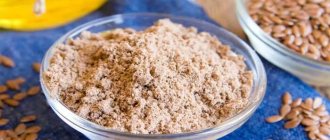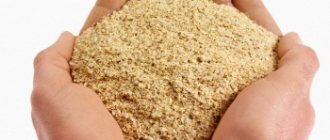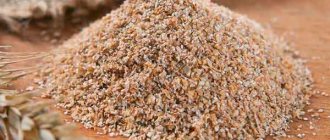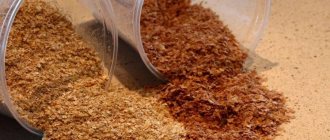Introduction
The seeds of the sesame plant, cultivated since ancient times (more than 7000 years ago) to this day in India, Pakistan, Central Asia, China, and Mediterranean countries, have long been used not only as a culinary seasoning, but also as a raw material for the production of the famous medicinal and cosmetic properties of sesame oil (for example, references to the healing power of sesame seeds are found in the medical tracts of Avicenna, and in ancient Egypt, sesame oil was already widely used in folk medicine in 1500 BC). Another name for sesame is “sesame”, which translated from the Assyrian language means “oil plant” ( the content of valuable sesame oil in sesame seeds reaches 60% ).
Sesame oil, which has a lot of useful properties, is currently widely used in folk medicine and home cosmetology, used in pharmaceutical and baking production, confectionery, canning and perfume industries, in the production of solid edible fats and lubricants.
How to select and store a product
Choice
Light has a detrimental effect on any oil, so a high-quality product must be poured into a dark glass bottle or have a protective cardboard box. But don’t even expect to buy good quality butter in a plastic container. This budget option definitely will not preserve the beneficial properties of sesame.
Your next step is to check the bottling and storage dates. From them you can determine how the oil was obtained. If done mechanically without refining and deodorizing, it will be stored from four to six months. And with additional chemical cleaning, the oil may not lose its properties for up to one and a half years. Only the manufacturer knows how many of those useful qualities remain.
Be sure to read the description on the label. If it is indicated that the oil can be used for massage, then beware of taking it - most likely it contains paraffin, which is not suitable for food.
Storage
Already at home you will be able to more fully evaluate the purchased product. Pour some butter into a saucer. A good unrefined one will have a golden yellow color and a delicate but rich aroma, and the taste will be soft and pleasant.
The dark brown color and distinct smell indicate that the oil is made from pre-roasted seeds. It will taste like oriental sesame halva or the familiar fried sunflower seeds. It's not that useful anymore.
And you shouldn’t even take refined oil. It has no taste, no smell, and a complete absence of useful components.
It is better to keep the treasured bottle in the refrigerator; at room temperature it can go rancid or oxidize. If you nevertheless bought the oil in a transparent container, then protect it from light by wrapping it in thick paper or pouring it into another dark glass bottle.
It is not recommended to store any oily substance for more than a month after opening, so try to use the oil for its intended purpose. Don't have time to eat it with salads? Then use it for cosmetic and medicinal purposes.
Use of sesame oil in cooking
Sesame oil is obtained from sesame seeds by cold pressing. Unrefined oil made from toasted sesame seeds has a distinctive dark brown hue, a rich, sweet, nutty flavor and a strong aroma (in contrast to the light yellow sesame oil made from raw sesame seeds, which has a less pronounced taste and odor).
Fragrant, rich in nutrients, unrefined sesame oil has long been widely used as a traditional ingredient in Indian, Japanese, Korean, Chinese and Thai cuisine (it is worth noting that before the advent of peanut oil, it was sesame seed oil that was most often used in India for cooking ). In exotic Asian cooking, sesame oil, especially well combined with honey and soy sauce, is most often used in preparing pilaf, seafood dishes, deep-frying and oriental sweets, marinating meat and vegetables, dressing meat and vegetable salads.
Just a few drops of sesame oil can add an original taste and unique aroma to a variety of Russian cuisine - soups, hot meat and fish dishes, mashed potatoes, porridges, cereal side dishes, gravies, pancakes, pancakes, homemade baked goods. For those who find the aroma of unrefined sesame oil too intense, we recommend mixing it with peanut oil, which has a “softer” aroma, when using this product for culinary purposes.
Unlike other edible oils (camelina, mustard, avocado), unrefined sesame oil is not suitable for frying ; it is recommended to add this plant product to hot dishes only before serving.
Having high nutritional and energy value and a high content of easily digestible fats and vegetable proteins, sesame oil can be successfully used as a component of dietary and vegetarian nutrition.
Due to the high content of natural antioxidants (and in particular sesamol), sesame oil is highly resistant to oxidation and has a long shelf life.
Delicious recipes for healthy dishes
Traditionally, recipes with sesame oil come to us from Asian cuisine and take their place of honor. The product is successfully used for dressing salads, sauces, and served with hot dishes.
You should not use it in large quantities for dishes with tomatoes, spinach and parsley.
Eggplant salad
Prepare eggplant salad with sesame oil:
Ingredients:
- medium-sized eggplant - 1 pc.;
- garlic - 15 gr.;
- soy sauce - 10 gr.;
- sesame oil - 10 g;
- vinegar - 2 gr.;
- monosodium glutamate - 1 gr.
Preparation:
- Wash and peel the eggplant.
- Remove seeds.
- Cut lengthwise into 2 halves.
- Add water and boil.
- Cool, cut into strips.
- Place on a plate.
- Sprinkle the roll with chopped garlic.
- Drizzle with a sauce made from soy sauce, sesame oil, MSG and vinegar.
Composition of sesame oil
Having a high nutritional value and a host of beneficial properties, sesame oil is optimally balanced in terms of the content of essential amino acids, polyunsaturated fatty acids, vitamins (E, A, D, B1, B2, B3, C) necessary for the human body, macro- and microelements (potassium, calcium, phosphorus, zinc, magnesium, manganese, silicon, iron, copper, nickel, etc.), and other valuable biological active substances (antioxidants sesamol and squalene, phytin, phytosterols, phospholipids, etc.).
The composition of sesame oil contains beneficial fatty acids in almost equal proportions - polyunsaturated linoleic acid (Omega-6) (40-46%) and monounsaturated oleic acid (Omega-9) (38-42%) (content of linolenic acid Omega-3 acids in sesame oil oil is insignificant - 0.2%). The Omega-6 and Omega-9 fatty acid complex contained in sesame oil helps improve the functioning of the cardiovascular, reproductive, endocrine and nervous systems, normalize fat metabolism and blood sugar levels, strengthen the immune system, reduce the risk of developing cancer, and also neutralize negative impact on the human body of various types of harmful substances (slags, toxins, carcinogens, radionuclides, salts of heavy metals).
Sesame oil is rich in antioxidant vitamins E, A and C , which have a beneficial effect on the cardiovascular system, have a powerful immunostimulating effect, and also have anti-inflammatory and wound-healing properties. the B vitamins included in sesame oil, vitamins E, A and C help improve the functions of the visual apparatus, and also have a very beneficial effect on the condition of the skin, nails and hair (in this regard, sesame oil, saturated with “youth” vitamins E , A and C have been widely and variably used in cosmetology for many centuries).
Sesame oil is also an excellent source of macro- and microelements necessary for the human body. In terms of the content of calcium necessary for the full development of bone and cartilage tissue, sesame oil is a record holder among most food products (just 1 teaspoon of sesame oil can satisfy the body's daily need for this macronutrient). The concentration of potassium, phosphorus, magnesium, manganese, zinc, and iron in sesame oil is also high (you can find out more about the beneficial properties of magnesium in the article “Comelina oil”, and information about the benefits of zinc for the human body is given in the article “Pumpkin oil”) .
Sesame oil, like other edible vegetable oils, contains phytosterols (beneficially affecting the immune system, skin condition, endocrine and reproductive system functions) and phospholipids (necessary for the proper functioning of the liver, brain, cardiovascular and nervous systems, and also for better absorption of vitamins A and E by the body).
Sesame oil, in addition, contains a powerful antioxidant, squalene , which is necessary for the full synthesis of sex hormones, helps reduce cholesterol levels in the blood and strengthens the immune system, and has pronounced bactericidal and antifungal properties. (detailed information about the beneficial properties of squalene is given in the article “Amaranth Oil”).
We recommend:
-0%
-0%
Radograd sesame oil, 100 ml
Not available
Add to cart
Beneficial properties of sesame oil and its use in the prevention and treatment of various diseases
Sesame oil, which has a wide range of therapeutic effects (anti-inflammatory, bactericidal, wound healing, analgesic, immunostimulating, anthelmintic, laxative, diuretic properties) has long been used in many countries around the world, not only as a valuable food product, but also as an effective traditional medicine. In particular, sesame oil is often mentioned in Ayurveda (the study of traditional methods of ancient Indian medicine) as “warming”, “hot and spicy”, “inhibiting mucus and wind”, “strengthening the body”, “removing poisons and toxins from the body” , a “heart nourishing” and “mind calming” natural remedy for many ailments.
Benefits of sesame oil for the digestive system. Neutralizes the increased acidity of gastric juice, brings relief from intestinal colic, has an anti-inflammatory, bactericidal, laxative and anthelmintic effect, helping to eliminate erosive and ulcerative damage to the mucous membranes of the gastrointestinal tract (thanks to the “wound healing” vitamins A and E, squalene, phospholipids included in the composition ) sesame oil can be used in the prevention and complex treatment of constipation, gastritis with high acidity, gastroduodenitis, stomach and duodenal ulcers, colitis, enterocolitis, pancreatic diseases, helminthiases. Due to the high content of phospholipids and phytosterols, which stimulate the process of bile formation and bile secretion, restoring the normal structure of the liver, sesame oil can also be included in the diet for the prevention of cholelithiasis and used in the complex treatment of diseases such as fatty liver, biliary dyskinesia, hepatitis. In the section “Healing recipes based on sesame oil” you will learn about various ways to use sesame oil in the prevention and treatment of diseases of the digestive system.
Sesame oil – for the health of the heart and blood vessels. Sesame oil contains a complex of substances that nourish and strengthen the heart muscle, increase the elasticity and strength of the walls of blood vessels, reduce the level of “bad” cholesterol in the blood, prevent the formation of cholesterol plaques in blood vessels, normalize blood pressure (among such substances are vitamin E, vitamin C, Omega-6 and Omega-9 acids, magnesium, potassium, manganese, iron, calcium, phytosterols, phospholipids, squalene, sesamin). In this regard, the introduction of sesame oil into the daily diet is an effective prevention and a useful component of complex treatment of diseases such as atherosclerosis, hypertension, coronary heart disease, arrhythmia, tachycardia, heart attack, stroke. Regular consumption of sesame oil, which helps increase platelet levels in the blood, is also especially useful for people suffering from diseases such as hemorrhagic diathesis, hemophilia, Werlhof's disease, essential thrombocytopenia, and thrombocytopenic purpura.
Sesame oil is a useful product for people with mental work. Sesame oil is rich in substances necessary for the full functioning of the nervous system, and in particular, for normal and coordinated brain activity (such substances include phospholipids, essential amino acids, zinc, phosphorus, B vitamins). Therefore, this plant product, which has high nutritional and energy value, is useful for use in the daily diet during intense mental stress, frequent stress, memory impairment, and attention disorders. Regular consumption of sesame oil, rich in Omega-9 oleic acid, is an effective prevention of serious diseases such as multiple sclerosis and Alzheimer's disease.
Sedative and antidepressant properties of sesame oil. Thanks to the high content of magnesium, B vitamins, polyunsaturated acids and the antioxidant sesamolin, sesame oil perfectly calms the nervous system , protecting it from the negative effects of psycho-emotional stress. Regular consumption of sesame oil helps eliminate insomnia, apathy, depression, increased irritability and fatigue. A massage using sesame oil promotes pleasant relaxation of tense muscles of the face and body.
The benefits of sesame oil for women's health. Sesame oil is optimally balanced in terms of the content of substances that have a beneficial effect on the functions of the endocrine and female reproductive system (among them - Omega-6 and Omega-9 acids, phytosterols with estrogen-like effects, vitamin E, squalene, zinc, B vitamins, phospholipids). Therefore, regular consumption of sesame oil can bring tangible benefits to women experiencing physiological and psycho-emotional discomfort during the premenstrual or menopausal period . And in addition, sesame oil, rich in vitamin E, necessary for proper embryonic development and full lactation, can rightfully take its rightful place in the daily diet of a pregnant or lactating woman.
The introduction of sesame oil into the daily diet will also bring tangible benefits for:
- Diabetes and obesity (sesame oil, which contains a number of substances involved in the synthesis of insulin by the pancreas (sesamin, manganese, magnesium, zinc, Omega-9 oleic acid, etc.), normalizes metabolism, promoting the effective “burning” of fat deposits due to excess weight).
- Diseases of bones, joints, teeth (having bactericidal and anti-inflammatory properties, rich in calcium, silicon, phosphorus, magnesium, vitamin C, necessary for the proper development, functioning and restoration of cartilage, bone and dental tissue, sesame oil can be successfully used in the prevention and complex treatment of various injuries of the musculoskeletal system, osteoporosis, osteochondrosis, gout, arthritis, arthrosis, rheumatoid arthritis, caries, periodontal disease, periodontitis).
- Anemia (sesame oil prevents the development of anemia, because it is rich in substances involved in the process of hematopoiesis - iron, manganese, magnesium, copper, zinc, phospholipids,)
- Respiratory diseases (sesame oil is an effective traditional medicine for eliminating dryness of the nasal mucosa, as well as complex treatment of ENT diseases, pneumonia, bronchial asthma, dry cough).
- Diseases of the urinary system (sesame oil, which has a bactericidal, anti-inflammatory and diuretic effect, is very useful to include in the diet for diseases such as urolithiasis, nephritis, pyelonephritis, cystitis, urethritis).
- Diseases of the visual organs (sesame oil contains a high content of vitamins A and C, B vitamins, zinc, calcium, magnesium, manganese - substances that help improve the functioning of the visual organs. You can learn more about the effect of these substances on the functional state of the visual apparatus from the article “ Eye balm “Blueberry-Dragon Eye”).
- Diseases of the male reproductive system (sesame oil contains a complex of substances (vitamin E, vitamin A, zinc, magnesium, squalene, phytosterols) that improve erection, the process of spermatogenesis and have a beneficial effect on the functioning of the prostate gland).
Regular consumption of sesame oil, which has powerful antioxidant and immunostimulating properties (thanks to its constituent vitamins E, A, C, squalene, sesamol, phospholipids, Omega-6 and Omega-9 acids) is an excellent prevention of various cancer diseases.
Sesame oil can also be successfully used as an integral component of sports nutrition (this herbal product, which helps build muscle mass, is often used by bodybuilders in their daily diet).
In the section “Medical recipes based on sesame oil” you will learn about various ways to use sesame seed oil in the complex treatment of various diseases.
We recommend:
-0%
-0%
Organic life sesame oil, 250 ml
Not available
Add to cart
The use of sesame oil in cosmetology and dermatology
Having bactericidal, wound-healing, anti-inflammatory, antifungal, immunostimulating properties that help improve the condition of the skin, sesame oil is a widely used folk medicine for the complex treatment of various dermatological diseases and skin damage (wounds, burns, eczema, psoriasis, mycoses, etc. ).
Rich in substances that have a beneficial effect on the condition of the skin, hair and nails (“youth vitamins” A, E and C, B vitamins, Omega-6 and Omega-9 acids, phytosterols, phospholipids, squalene, silicon, magnesium, phosphorus, calcium , zinc), sesame oil has a very wide range of cosmetic effects. Namely:
- Penetrating deeply into the skin, sesame oil promotes active nutrition, moisturizing and softening (vitamin E contained in this oil perfectly moisturizes the skin, and squalene, which is part of sesame oil, stimulates oxygen exchange and blood circulation in the skin)
- Biochemical components of sesame oil that promote natural collagen synthesis (proteins, silicon, vitamin C) give the skin firmness and elasticity.
- Sesame oil helps maintain normal water-lipid balance of the skin and restore the protective functions of the epidermis
- Sesame oil perfectly cleanses the skin surface of dead cells, dirt and various harmful substances and promotes rapid regeneration of the skin.
- Possessing anti-inflammatory and bactericidal properties, being an excellent source of zinc necessary for the skin, sesame oil is especially useful for acne, as well as various skin irritations accompanied by redness, peeling or inflammation.
- Sesame oil, rich in antioxidants, prevents premature skin aging , incl. associated with excessive exposure to sunlight or hormonal disorders (sesame oil contains the antioxidant sesamol, which intensively absorbs ultraviolet radiation, as well as substances that help normalize hormonal balance - phytosterols, phospholipids, Omega-6 and Omega-9 acids, vitamin E, vitamins group B, zinc).
Thanks to the properties described above, sesame oil is widely used in home cosmetology as:
- Base oil for the preparation of various creams, balms, lotions, masks for the care of fading, dry, flaky and sensitive skin of the face, hands and neck, lip balms, moisturizing creams for the skin of the eyelids
- An integral component of all kinds of cosmetics intended for the care of oily skin (sesame oil helps normalize the functioning of the sebaceous glands)
- Ingredients in various sunscreen cosmetics (cosmetics “for tanning” and “after tanning”)
- Base oil for aromatherapy (sesame oil combines most successfully with essential oils of myrrh, lemon, bergamot, geranium, frankincense, etc.)
- Massage oils (rich in “anti-stress” magnesium, excellent for relaxing facial muscles, sesame oil is an effective means for a relaxing massage)
- Stabilizing antioxidant for other base oils (due to its high resistance to oxidation, sesame oil is often used in a mixture with rapidly oxidizing oils. For example, almond oil increases its stability to oxidation in the presence of sesame oil by 28%)
- Products for the care of delicate, sensitive baby skin
- Skin cleansers and makeup removers
- Nail care products (external use of sesame oil in the form of cosmetic baths helps to enhance nail growth and prevent their fragility and delamination; in addition, due to its antifungal properties, sesame oil is often used in the complex treatment of nail fungus)
- Hair care products (rich in silicon, vitamins E and group B, essential for healthy hair, sesame oil is a very effective remedy for brittle hair and hair loss, as well as an excellent nourishing and restorative component in masks for damaged or colored hair. Sesame oil normalizes the functioning of the sebaceous glands the oil is also useful for use in the complex treatment of seborrhea)
You can familiarize yourself with various methods of preparing and using the above homemade cosmetics in the section “Cosmetic recipes based on sesame oil.”
How to use sesame oil
For adults, sesame oil is recommended to be consumed in its pure form (1 teaspoon 2-3 times a day with meals), or used in salad dressings or in the preparation of various culinary dishes.
For children, the daily dose of sesame oil should be:
At the age of 1 to 3 years – 3-5 drops;
At the age of 3 to 6 years – 5-10 drops;
From 10 to 14 years old – 1 teaspoon.
You can learn about the benefits of culinary and cosmetological use of this useful herbal product in the sections “Using sesame oil in cooking” and “Using sesame oil in cosmetology and dermatology.”
A detailed description of various methods of home therapeutic, preventive and cosmetic use of sesame oil is given in the sections “Medical recipes based on sesame oil” and “Cosmetic recipes based on sesame oil”.
Contraindications
Oil is considered a harmless product, but is it really useful? Still, you should not neglect certain safety measures when taking them , because properties that improve the condition in one case may worsen it in another:
- since the drug enhances blood clotting , it is contraindicated for persons with increased clotting, varicose veins, or a tendency to form blood clots;
- You should not use it if you are prone to stone formation - combined use with aspirin, oxalic acid, and estrogen derivatives leads to the formation of insoluble compounds;
- for persons prone to allergic reactions , perform a skin test before taking it: apply a small amount of the substance to the wrist or inner bend of the elbow and wait 1-2 hours to see if redness occurs;
- excessive consumption may lead to hypercalcemia ;
- although its use is recommended during pregnancy, you must first consult with your doctor;
- since the product has a mild laxative effect . Persons with a tendency to diarrhea need to carefully consider the dosage, and if the effect is very pronounced, abandon it altogether.
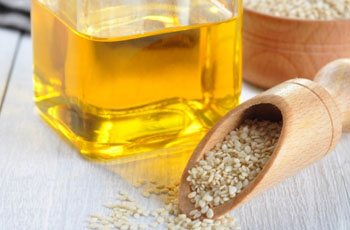
Have you tried many diets, but nothing helps? You should be interested in seeing the results and reading reviews about the Japanese diet, the principles of this weight loss technique.
The healing properties of lingonberry leaves for various diseases - areas of application, methods for preparing a decoction can be found in our material.
Why is walnut oil useful, its use in cooking, cosmetology - read about everything in our special article.



